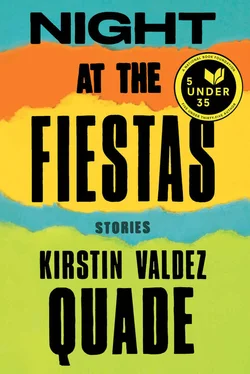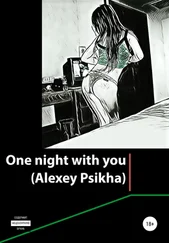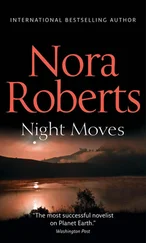Andrea had been shocked. In the face of her mother’s shock, though, she’d feigned total equanimity. “No one’s really straight,” Andrea explained, “not one hundred percent.”
So it was that the Lowells, poised and affectionate and photogenic, now found themselves cut down by a crisis that had all the elements of a joke, and it seemed to Andrea that the balance between them had shifted. In Andrea’s mind Parker underwent a faint oxidation, taking on a patina, for the first time, of vulnerability. Again Andrea found herself seeking Parker on campus, this time so she might extend her hand in friendship.
WHEN THEY STEPPED into the clearing between the orchards and the rows of highbush Jubilee blueberries, Andrea saw that her father’s taco truck had inspired a whole Mexican theme. Gone were the sun-faded Porta-Pottys and the water truck; in their place, the Lowells had erected a tent festooned with fluttering papel picado flags. Elderly people in pastels sat in the shade and the younger people stood around drinking margaritas. White tablecloths rippled in the hot breeze. In the center of each table sat a little piñata on bright woven fabric.
And there, at the edge of the party, was the taco truck itself. From where she stood, Andrea could see her father’s arms handing full plates out the sliding window. She remained out of his line of vision. He’d be surprised and proud and pleased to see her here as a guest, would probably think Parker had invited her personally, but she didn’t feel like getting into explanations, and she didn’t want to establish herself as the daughter of the cook, at least not yet.
The truck did look festive here, Andrea saw with disappointment, against the backdrop of trees. A colorful hand-painted sign announced a pared-down, classed-up menu: Kobe beef, wild-caught salmon, free-range chicken, and vegetarian, all on blue corn tortillas.
“A vegetarian on a tortilla,” said Andrea. “Ha.”
“Funny,” said Matty. He scanned the crowd. “They know how to do it up.”
Tacos were not the only option: caterers in white shirts presided over a vast spread of fresh, colorful food. Tin buckets were lined up on another table, a grosgrain ribbon tied around each handle. Already several beautifully dressed children were in the blueberry rows, picking.
And now, turning toward Andrea, in a floral shift and Converse sneakers without socks, was Parker. In one hand she swung a bucket, and in the other she held a massive sloshing glass of wine. “Andrea?” She tilted her head, her red hair shining in the sun and slipping over her shoulder. “Your dad didn’t say you were coming. It’s so great you could make it!”
Was Parker going to hug her? Yes, she was. Andrea put her arms around Parker, and there was nothing casual about it, nothing breezy. She pulled away too soon, terrified Parker would feel the price tags.
“So,” Andrea said, tongue-tied. She brandished her invitation. “Do I need to give this to you?”
Parker looked at the invitation, but made no move, and it remained there, large and clumsy in Andrea’s hand. Stupid, to think she might be required to present it like a ticket. She waved it at the party and the field and the orchards. “It all looks great. I haven’t been out here in years.”
Parker stuck her hand out at Matty. “Parker. Great to meet you.”
“Oh, sorry. This is Matty.” Andrea smiled at him in a way that she hoped looked affectionate and familiar and somehow also conveyed the sense that they were having lots of spectacular sex.
“Matthew,” said Matty.
Andrea smiled woodenly; Matty jingled the coins in his pocket with one hand and, with the other, thumbed the edge of his repellent little mustache.
Andrea had imagined cornering Parker near the truck, plying her with tacos, which Parker, too polite to refuse, would choke down in class-conscious misery until she was sick. Absurd and far-fetched, yes, but Andrea had gotten a grim pleasure from the image. Now, though, she felt pathetic for even thinking it.
As if reading her mind, Parker ran her hand through her hair, glanced at the taco truck, then back at Andrea. At least she had the grace to look uncomfortable. “It’s so great of your dad to be here. His tacos are awesome. I ate like six already.”
“Yes,” agreed Andrea. “They are pretty great.” How many times were they going to say great ?
A gold Tiffany’s heart dangled at Parker’s throat. Something about the necklace combined with the Converse suddenly enraged Andrea. “Man,” she said, “I was really sorry to hear about your parents. I mean, it must have really turned your world upside down.”
Parker shrugged, but her throat beneath the gold chain splotched red. “They seem to have gotten over it.” She jerked her thumb at one of the clumps of laughing adults. “My dad can’t keep his hands off Judith.”
And indeed William Lowell had his arm around the thick waist of a beaming woman who could only be the widow. She was short-haired and mannish, a silk scarf tied in the collar of her striped Oxford. It was no surprise she wasn’t as pretty as Elizabeth Lowell, Andrea supposed; William Lowell had been burned by beauty. Still, she felt obscurely disappointed by the widow, as though William Lowell had been guilty of a lapse in taste.
“Weird that I hardly see you at school.” Parker smiled. “We must travel in different circles.” She turned to Matty and said seriously, “Andrea is super smart.”
Matty snorted. “She thinks so.”
Was Parker mocking her? Encouraging her? Andrea bristled. Parker didn’t know how smart she was. Parker didn’t know one thing about her.
“Seriously, I hear you’re doing really well. Your dad tells my dad.”
The thought of her father bragging about her was horrifying. Every term this year (and in spite of a B-minus in chemistry), Andrea had received honor roll certificates from the Chicano student association, which had made her proud until she realized they were just part of all the extra efforts made on behalf of minority students: the special dinners and study breaks and offers for faculty mentorship with junior faculty eager to bolster their tenure files. Still, she’d sent the certificates home to her parents, who didn’t know the difference. Now, though, she had a hideous vision of her father flapping the flimsy sheets in William Lowell’s face, William Lowell’s indulgent smile. William Lowell didn’t brag to Salvador about Parker’s accomplishments, you could be sure of that.
“Last time I was out in the field I was nine, I think,” said Andrea. “You were here, too. Do you remember?”
Parker shook her head.
“Why would you? It was so long ago. You were picking blueberries for your mom, and I wanted to help, too, so Isabel — Isabel Gutierrez? — you probably don’t know her, she worked here for years — anyway, Isabel gave me a bucket. So I was out there picking away, happy as can be. Then your dad came down the row and yelled for me to stop.” Andrea laughed heartily, mirthlessly. “He was worried about child labor laws! Wouldn’t want anyone to come by and find a little Mexican kid picking blueberries!”
Parker tipped her head, laughed uncertainly. Her entire face was pink now. “Sounds like maybe he was being a bit too scrupulous.”
Andrea shrugged. “I’ve just always remembered it. You kept picking. It wasn’t child labor for you. You were just getting some berries for a pie.” She smiled.
Even Parker’s flushed face irritated Andrea. What was she, some swooning Victorian?
“Well, pick as much as you like today.” Parker nodded at the children in the rows. “Today we’re even allowing child labor.”
Parker politely extricated herself, and then she was off to charm other guests with her straight teeth and easy personality. Matty stood watching her, jingling the change in his pockets.
Читать дальше












